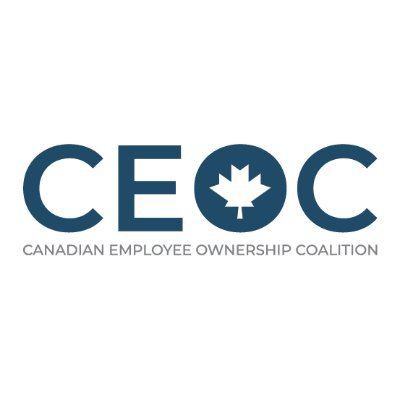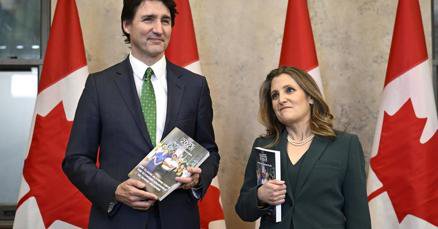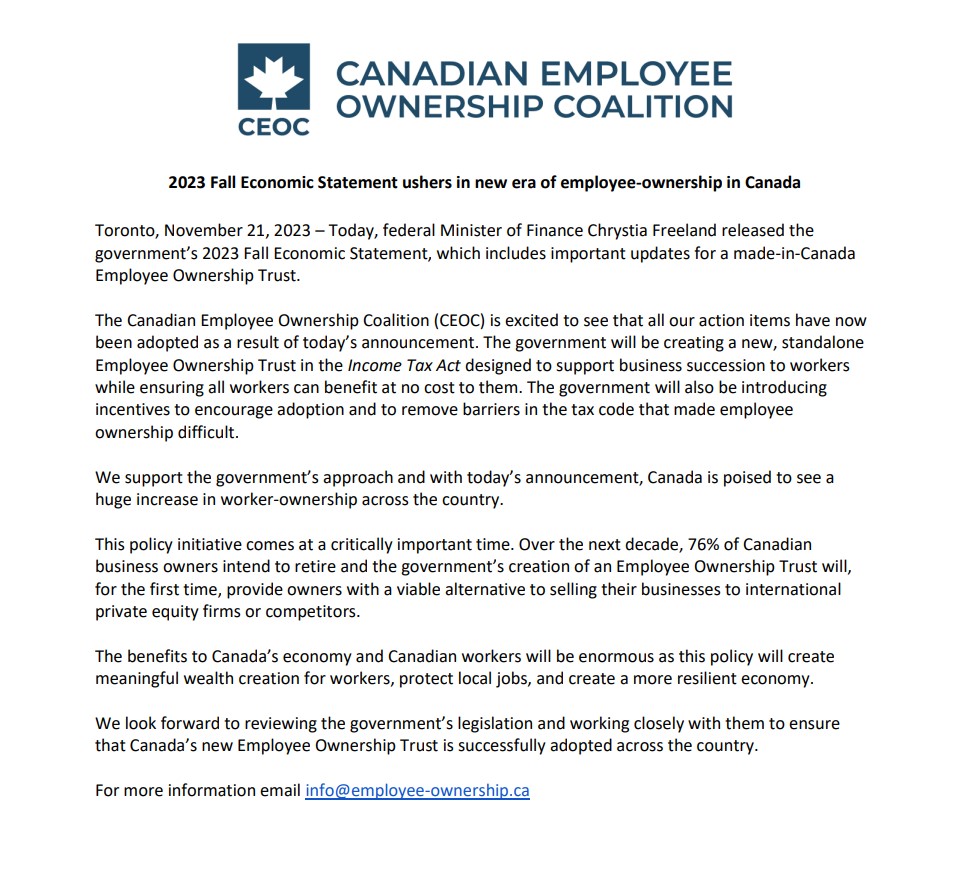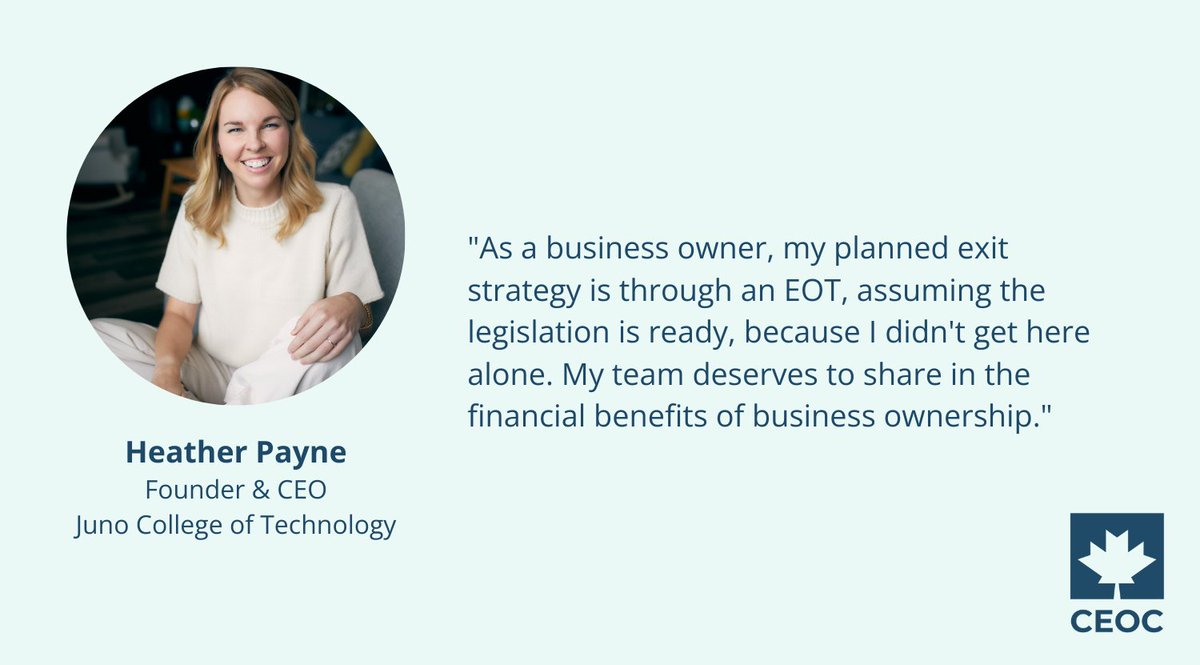
Canadian Employee Ownership Coalition
@CanadaEO
Followers
291
Following
232
Media
45
Statuses
164
We are committed to unlocking the potential of Employee Ownership for the benefit of Canada’s economy and workers.
Joined October 2020
After taking the time to review the legislation in Deputy Prime Minister @cafreeland's recent Budget Bill, we are ready to celebrate. 🎉👏 Employee Ownership Trusts are well on their way to being a reality in 🇨🇦 This is a big win for workers and local communities!
0
7
16
The @OntarioCofC's 2024 pre-Budget submission is forward looking - it recommends the province start work on an Employee Ownership policy framework. With federal legislation almost in place, it's time for provinces to think about their own policy levers. https://t.co/F5TIUBLEhQ
0
1
3
Lisa Taylor (@changepaths) in the @TorontoStar explains how Employee Ownership Trusts could disproportionately benefit women entrepreneurs. But only - as she notes - if the government steps up with robust incentives in the upcoming Budget. 👇 https://t.co/0uaZvSe7Av
thestar.com
As the government prepares the 2024 budget, advancing policies to encourage EOT adoption and creating tax incentives for implementation should be a top priority, writes Lisa Taylor.
0
0
2
Thank you @TonyLoffreda for the ongoing championing of employee ownership in Canada.
Every month, I publish an article that highlights some of my current work as a Senator. Check out my latest article on Employee Ownership Trusts. ******** Chaque mois, je publie un article qui met en lumière certains de mes travaux actuels en tant que sénateur. Jetez un coup
0
1
5
Great news coming out of Canada - tax incentives have been added to their EOT policy - we can vouch for this being powerful in growing employee ownership in the UK! #employeeownership
@cafreeland's Fall Economic Statement marks a watershed moment for employee ownership in Canada. Starting in Jan 2024, a new made-in-Canada Employee Ownership Trust will help workers across the country build wealth and keep jobs in local communities.
0
3
8
Among many other meaningful elements of the Fall Economic Statement from @cafreeland, I couldn’t be more pleased to see the advocacy and hard work of so many stakeholders, lawmakers, and activists paying off for Canada, Canadians and the climate. 🇨🇦🌎 Thank you for your efforts
0
20
57
When legislation passes later this fall, it will be a powerful starting point for employee ownership in this country, and we commend the government for their ambition.
0
0
4
Our Coalition had the support of many strong advocates helping us to get here. Special thank-you's to @cafreeland, @TurnbullWhitby, @TonyLoffreda, @SenatorHYussuff, @rechievaldez and Senator Frances Lankin.
2
1
4
We've seen what a similar policy has accomplished in the UK. Since 2014, they've created over 1500 majority employee-owned companies. Last year, between 5-10% of all private business sales were to employees. In Canada, this could mean 15-20K Canadian worker-owners annually!
1
0
6
Tim Masson, Chief Steward and CEO of Raise, as well as one of our Steering Committee members, has just had an important piece published in the Toronto Star, calling for Ottawa to make it easier for owners to sell their businesses to their employees:
thestar.com
Employee Ownership Trusts are supposed to be coming in Canada this year, writes Tim Masson — but the details of the legislation matter.
0
0
3
Wesley Novotny is a Tax Partner at the law firm Bennett Jones. Wesley has written about the potential for employee ownership in Canada and contributed to EOT policy development. #EmployeeOwnership #CanadianEconomy
0
0
0
One of our Steering Committee Members, Tiara Letourneau, has just released an op-ed in The Province about how Employee Ownership Trusts help keep businesses local and prosperous, and why it's time for federal legislation to help build that foundation.
theprovince.com
0
0
0
Christine Cooper is the Head of Commercial Lending at BMO, which has been one of the leading lenders to employee-owned companies in the United States for 50 years. She is passionate about the benefits of having the same options available to Cdn business owners #EmployeeOwnership
0
0
0
Heather Payne is the CEO of Juno College of Technology. A long-time entrepreneur, Heather would like to be among the first to adopt a new Employee Ownership Trust in Canada. #EmployeeOwnership #CanadianEconomy
0
0
1
Victor Beausoleil is the Executive Director of SETSI, and in his social justice work is an advocate for employee ownership in Canada #EmployeeOwnership #CanadianEconomy
0
0
1
The UK's Employee Ownership Association has released a report on the benefits of #employeeownership, showcasing significant impacts. This paves the way for Canada too. Read the report here: https://t.co/UrW3mGdqWh
#CanadianEconomy
0
0
3
Tiara Letourneau is CFOO of Rewrite Capital Advisors and a long-time advocate for #employeeownership in Canada. Rewrite sees a path to building wealth for women and BIPOC workers by financing employee ownership throughout North America. #CanadianEconomy
0
0
6
Dave Filipchuk is in his 40th year with 100% employee owned @PCLConstruction, currently serving as president and CEO. #EmployeeOwnership #CanadianEconomy
0
3
9
The expectation is that the Government will soon legislate employee ownership trusts into the Income Tax Act. They committed to doing that earlier this year in Budget 2023. But the Government needs to get it right which is why I continue to believe that the EOT model it will
0
2
3
Ilse Treurnicht is an Impact Investor, Advisor, and Director at TwinRiver capital #EmployeeOwnership #CanadianEconomy
0
0
1

















